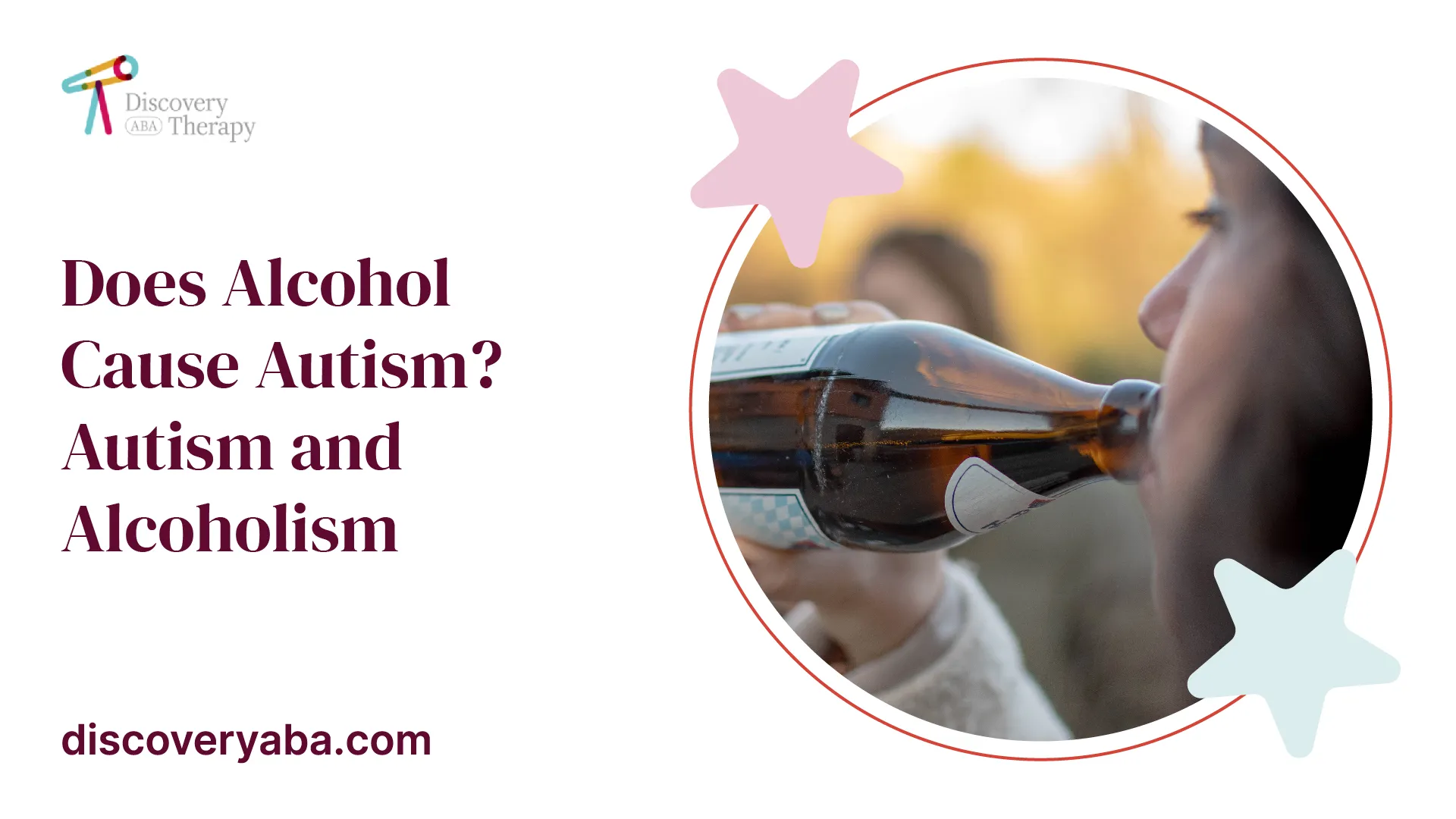Does Alcohol Cause Autism? Autism and Alcoholism
One environmental factor that has been suggested as a possible cause of autism is alcohol consumption during pregnancy. In this article, we will explore the question, "does alcohol cause autism?"

Autism and Alcoholism's Link
The answer is not clear-cut. While there is evidence to suggest a link between alcohol consumption and an increased risk of autism, it is not the only factor that can contribute to the development of the disorder.

However, given the potential risks to fetal development, it is recommended that pregnant women avoid alcohol altogether. If you are pregnant and struggling with alcohol use, it's important to seek help from a healthcare provider.
First, let's look at the research on the subject. Several studies have found a link between alcohol consumption during pregnancy and an increased risk of autism in offspring.
One study published in the journal Pediatrics found that children born to mothers who drank during pregnancy had a 44% higher risk of developing autism than children born to mothers who did not drink.
Another study published in JAMA Pediatrics found that children who were exposed to alcohol in utero had a higher likelihood of developing autism spectrum disorder (ASD) than children who were not exposed.
So, it seems that there is some evidence to suggest that alcohol consumption during pregnancy may increase the risk of autism. But how does alcohol affect fetal development?
Alcohol is a teratogen, which means it can cause birth defects and developmental disorders. When a pregnant woman drinks alcohol, it passes through the placenta and into the developing fetus.
The fetus is unable to metabolize alcohol as quickly as an adult, which means that alcohol levels in the fetus can be much higher than in the mother's bloodstream. This can lead to damage to the developing brain and nervous system.
The effects of alcohol on fetal development are known as fetal alcohol spectrum disorders (FASDs). FASDs can cause a range of developmental problems, including cognitive impairment, behavioral problems, and physical deformities.
Autism is not technically a FASD, but it is considered to be part of the broader spectrum of neurodevelopmental disorders that can be caused by alcohol exposure in utero.
It's important to note that not all children who are exposed to alcohol in utero will develop autism or other neurodevelopmental disorders. The risk appears to be influenced by a variety of factors, including the amount and timing of alcohol exposure, genetic factors, and other environmental factors.
Long-term Effects of Alcohol Exposure During Pregnancy
While the immediate effects of alcohol exposure during pregnancy are well-documented, there is also concern about the potential long-term effects on a child's behavior and cognitive development.
Studies have found that children who were exposed to alcohol in utero may be at an increased risk for attention deficit hyperactivity disorder (ADHD) and other behavioral problems. They may also have difficulty with executive function, which includes skills such as planning, organizing, and problem-solving.
In addition, research has shown that alcohol exposure during pregnancy can lead to long-term changes in brain structure and function.
These changes may contribute to learning difficulties and other cognitive impairments later in life.
It's important to note that not all children who are exposed to alcohol in utero will experience these long-term effects. However, it is clear that alcohol can have a significant impact on fetal development and can increase the risk of a range of developmental disorders.
Given these potential risks, it is recommended that pregnant women avoid alcohol altogether. If you are struggling with alcohol use during pregnancy, it's important to seek help from a healthcare provider as soon as possible.
FAQs
How does alcohol affect autistic people?
While alcohol consumption during pregnancy has been linked to an increased risk of autism, it is important to note that the effects of alcohol on individuals with autism are not well understood. Some research suggests that individuals with autism may be more sensitive to the effects of alcohol, while others suggest that they may be less sensitive.
One study published in the Journal of Autism and Developmental Disorders found that individuals with autism who consumed alcohol reported experiencing greater levels of intoxication than their neurotypical peers.
Another study published in Alcohol and Alcoholism found that individuals with autism may have difficulty recognizing social cues related to drinking, such as when it is appropriate to refuse a drink or stop drinking.
It's important for individuals with autism (and everyone else) to understand the potential risks associated with alcohol consumption, including impaired judgment, motor coordination difficulties, and increased risk of accidents or injuries. It's also important for healthcare providers to consider the unique needs and sensitivities of individuals with autism when providing guidance on alcohol use.
Can people with autism drink alcohol?
While people with autism can legally drink alcohol if they are of legal drinking age, it is important to consider the potential risks and sensitivities associated with alcohol use.
As mentioned earlier in this article, some studies have suggested that individuals with autism may be more sensitive to the effects of alcohol than their neurotypical peers.
In addition, people with autism may have difficulty recognizing social cues related to drinking, such as when it is appropriate to refuse a drink or stop drinking. This can potentially lead to overconsumption or other risky behaviors.
It's important for individuals with autism (and everyone else) to understand the potential risks associated with alcohol consumption, including impaired judgment, motor coordination difficulties, and increased risk of accidents or injuries.
It's also important for healthcare providers to consider the unique needs and sensitivities of individuals with autism when providing guidance on alcohol use.
Is there a safe amount of alcohol that can be consumed during pregnancy?
No. The American College of Obstetricians and Gynecologists recommends that pregnant women avoid alcohol altogether, as even small amounts can pose a risk to fetal development.
Can fathers' alcohol consumption increase the risk of autism in offspring?
While research has primarily focused on maternal alcohol consumption, some studies have suggested that paternal alcohol use may also contribute to an increased risk of autism in offspring. However, more research is needed to fully understand this relationship.
Can drinking after pregnancy increase the risk of autism in offspring?
There is currently no evidence to suggest that drinking after pregnancy can increase the risk of autism in offspring. However, heavy drinking after pregnancy can still have negative effects on a child's development and should be avoided.
Are there any treatments for Fetal Alcohol Spectrum Disorders (FASDs)?
While there is no cure for FASDs, early intervention and treatment can help improve outcomes for affected individuals. Treatment may include therapy, medication, and supportive services.
What are some other environmental factors that may contribute to the development of autism?
In addition to alcohol consumption during pregnancy, other environmental factors that have been suggested as possible contributors to the development of autism include exposure to certain chemicals or pollutants, viral infections during pregnancy, and advanced parental age at conception. However, more research is needed to fully understand these relationships.
Summary
In conclusion, while alcohol consumption during pregnancy may increase the risk of autism, it is not the sole cause of the disorder. Autism is a complex condition that is influenced by a variety of genetic and environmental factors. Pregnant women should avoid alcohol to minimize the risk of fetal alcohol spectrum disorders and other developmental problems.
References
- https://americanaddictioncenters.org/rehab-guide/autism
- https://www.autism.org.uk/advice-and-guidance/professional-practice/autism-alcohol
- https://www.arrowpassage.com/autism-and-alcohol/
- https://www.tikvahlake.com/blog/drug-overdose-deaths-statistics/
- https://www.psychiatry.org/patients-families/autism/what-is-autism-spectrum-disorder
- https://www.ncbi.nlm.nih.gov/pmc/articles/PMC4493816/
- https://source.wustl.edu/2014/05/people-with-autistic-tendencies-vulnerable-to-alcohol-problems/
Does Your Child Have An Autism Diagnosis?
Learn More About How ABA Therapy Can Help
Find More Articles
Contact us
North Carolina, Nevada, Utah, Virginia
New Hampshire, Maine
Arizona, Colorado, Georgia, New Mexico, Oklahoma, Texas
.avif)




































































































